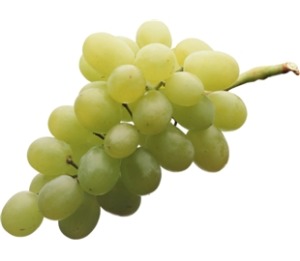Johanna Brandt and Fred Wortman – Cancer Grape Diet
Johanna Brandt and Fred Wortman once became famous for their ideas that grapes could be a cure for cancer. Their cancer cure ideas are still being discussed today. Grapes, with their wealth of antioxidants and longevity-promoting  polyphenols have, in recent years, been applauded for their role in heart health–but the benefits of grapes actually go far beyond just that. The antioxidants in grapes are important for eye health, controlling diabetes and other chronic conditions, and grapes also contain the flavonoids myricetin and quercetin, which help the body to counteract harmful free radical formation. Perhaps, then, it’s little surprise that this highly anti-inflammatory food is also a potent blend against cancer. Grapes contain numerous nutrients and anti-oxidants, such as:
polyphenols have, in recent years, been applauded for their role in heart health–but the benefits of grapes actually go far beyond just that. The antioxidants in grapes are important for eye health, controlling diabetes and other chronic conditions, and grapes also contain the flavonoids myricetin and quercetin, which help the body to counteract harmful free radical formation. Perhaps, then, it’s little surprise that this highly anti-inflammatory food is also a potent blend against cancer. Grapes contain numerous nutrients and anti-oxidants, such as:
1) ellagic acid
2) catechin
3) quercetin
4) oligomeric proanthocyanidins (OPC) or procyanidolic oligomers (PCO)
5) resveratrol
6) pterostilbene
7) selenium
8) lycopene
9) lutein
10) laetrile (amygdalin or Vitamin B17) (seeds)
11) beta-carotene
12) caffeic acid and/or ferulic acid (together they kill cancer cells)
13) gallic acid
Johanna Brandt
Long before all of this was understood, back in the 1920s, a South African Woman by the name of Johanna Brandt was diagnosed with stomach cancer. Brandt was a naturopath who had spent years experimenting with various fasts and diets, and upon her diagnosis, she decided to try a “grape diet” consisting of grapes and water in two distinct fasts. Her stomach cancer did indeed vanish after she adopted this diet.
The original diet involves 12 hours of fasting every day, followed by 12 hours where the patient consumes absolutely nothing except grapes (and/or grape juice). The consumption of the grapes is spread out over the 12 hours, not eaten in large portions.
The theory behind why this works is due to the cancer cell’s hunger for glucose. Cancer cells consume many times more glucose than normal cells do, and grape juice is nearly pure sugar. Ergo, the water fast makes the cells hungry and when the grape juice is administered, the cancer cells ravenously consume the fruit sugar. But, at the same time, they are consuming the vitamins and nutrients. Seems all too good to be true, but at this time in the 1920’s, it was quite a theory.
Fred Wortman
Fred Wortman, a native of Albany, Georgia, developed an inoperable malignancy of the intestine; he needed extensive chemotherapy, but could not afford it. “The doctors,” Mr. Wortman is quoted as saying, “refused to operate when they discovered the condition of my bank balance.”
A well-read individual, he recalled a remedy for cancer described in a book by a “Mrs. Brandt,” and looked it up. He simplified what Brandt advised, took the “cure,” and was completely cancer free within a month. The original situation was most likely longer than just one month but the miracle story has been spreading continuously gaining exageration each time it is told! Wortman went to the press and had his experience published in “The Independent,” whereafter he received hundreds of replies. Over 200 cancer sufferers reported complete recovery.
Wortman’s treatment is as follows:
“Begin with a 24 oz. bottle of (dark concord) grape juice the first thing in the morning. Take a couple of swallows every 10 or 15 minutes (Don’t gulp it down all at once). Do not eat until Noon.
After 12 o’clock, live the rest of the day normally, but do not eat anything after 8 o’clock in the evening…food seems to carry off the curative agent in the grape juice, which may be magnesium (sic), so stick to the fast between 8 P.M. and Noon the following day. Keep this up every day for 2 weeks to one month.”
Cancer Prevention
This is a grand story with very little science and safety behind it. There are some clear benefits though weaved through the story. Grapes should not be used as a cancer cure as there have been dramatic advances since the 1920’s. They can be used as part of a healthy diet though and may have a role in cancer prevention. The antioxidant resveratrol has been confirmed by scientists as having strongly anti-carcinogenic properties. Muscadine grapes have the highest concentration of resveratrol in nature because of their extra thick skins and numerous seeds where it is concentrated. Furthermore resveratrol can be found in concentrated formulations. For more information, please get in touch to speak to someone in the clinic.
